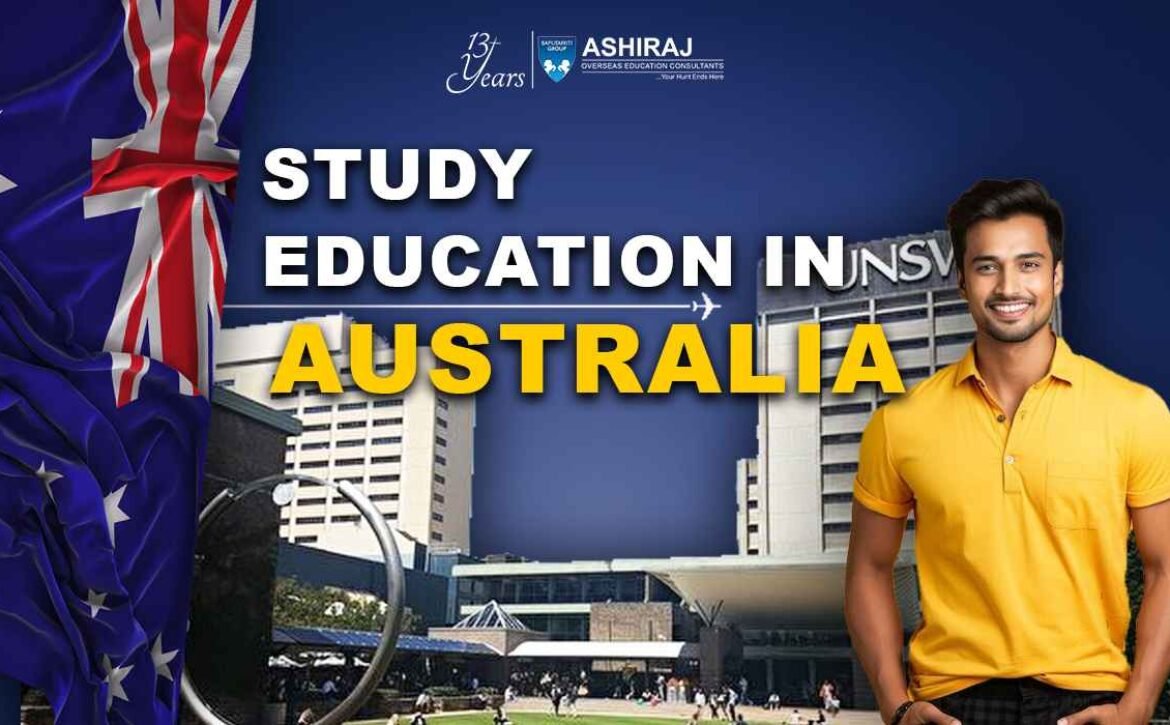
Education in Australia
Australia boasts a robust and diverse educational landscape, making Education in Australia a topic of global interest. With a commitment to excellence, inclusivity, and innovation, Australia offers a comprehensive education system from early childhood through to tertiary levels. The Australian education system is characterized by its high academic standards, state-of-the-art facilities, and emphasis on fostering critical thinking and creativity among students.
At the primary and secondary levels, education in Australia is primarily delivered through government-funded schools as well as private institutions, ensuring accessibility and choice for students and families. Additionally, Australia’s world-renowned universities attract students from around the globe, offering a wide range of courses and research opportunities. The country’s multicultural environment enriches the educational experience, providing students with a global perspective and preparing them for success in an increasingly interconnected world. Education in Australia continues to evolve, driven by a commitment to quality and innovation, positioning the country as a leader in global education.
Why to Study Education in Australia?
- World-Class Institutions: Australia is home to several top-ranking universities renowned for their excellence in education, offering a wide range of programs in the field of education.
- Innovative Teaching Methods: Australian universities adopt innovative teaching methodologies, incorporating practical experiences and research-based learning, providing students with a holistic understanding of education practices.
- Diverse Cultural Exposure: Studying education in Australia exposes students to a multicultural environment, enhancing their cultural competency and preparing them to work in diverse educational settings globally.
- Internship and Work Opportunities: Many education programs in Australia offer internships and practical placements in schools, providing students with hands-on experience and networking opportunities within the education sector.
- Global Recognition: A degree in education from an Australian institution is highly regarded worldwide, opening doors to career opportunities in various educational settings internationally.
- Supportive Learning Environment: Australian universities prioritize student support services, offering mentorship programs, academic counseling, and resources to ensure student success and well-being.
- Research Opportunities: Australia encourages research in education, providing ample opportunities for students to engage in cutting-edge research projects and contribute to advancements in the field.
- Quality of Life: With its high standard of living, safe environment, and beautiful landscapes, Australia offers an ideal setting for students to focus on their studies and enjoy a balanced lifestyle.
Top Universities to Study Education in Australia
Rank | University | QS World University Ranking 2023 | Type of University | Average Annual Fees | Programs Offered |
1 | Australian National University (ANU) | 20 | Public | $25,000 – $35,000 | Education, Teaching, Educational Leadership |
2 | University of Melbourne | 25 | Public | $28,000 – $38,000 | Education, Early Childhood Education |
3 | University of Sydney | 32 | Public | $30,000 – $40,000 | Education, Educational Psychology |
4 | University of Queensland | 42 | Public | $27,000 – $37,000 | Education, Special Education |
5 | University of New South Wales | 45 | Public | $26,000 – $36,000 | Education, Curriculum and Instruction |
- Australian National University (ANU): ANU is ranked 20th globally and offers programs in Education, Teaching, and Educational Leadership.
- University of Melbourne: Ranked 25th worldwide, the University of Melbourne provides programs in Education and Early Childhood Education.
- University of Sydney: With a global ranking of 32, the University of Sydney offers courses in Education and Educational Psychology.
- University of Queensland: Ranked 42nd internationally, the University of Queensland provides education programs with a focus on Special Education.
- University of New South Wales: The University of New South Wales, ranked 45th globally, offers programs in Education, including Curriculum and Instruction.
These universities represent the pinnacle of education in Australia, providing diverse programs and research opportunities for aspiring educators.
Course Curriculum for Education in Australia
- Foundational Knowledge: Education programs in Australia typically begin with foundational courses covering topics such as educational psychology, child development, and teaching methodologies, providing students with a solid theoretical understanding of education principles.
- Specialization Options: Students have the opportunity to specialize in various areas of education, including early childhood education, special education, curriculum development, and educational leadership, allowing them to tailor their studies to their interests and career goals.
- Practical Experience: Education programs in Australia often include practical components such as classroom placements, internships, and teaching practicums, enabling students to apply their theoretical knowledge in real-world educational settings and gain valuable hands-on experience.
- Research Opportunities: Many education programs incorporate research components, where students engage in independent or collaborative research projects, contributing to the advancement of knowledge in the field of education.
- Technology Integration: With a focus on innovation, education curricula in Australia often integrate technology into teaching and learning practices, preparing students to effectively utilize digital tools and resources in educational settings.
- Inclusive Education: Courses in inclusive education are emphasized, teaching students how to create inclusive learning environments that cater to the diverse needs of all learners, promoting equity and accessibility in education.
- Global Perspectives: Education curricula incorporate global perspectives, exposing students to diverse cultural, social, and educational contexts, fostering their understanding of international education practices and issues.
- Professional Development: Education programs also focus on professional development, equipping students with the skills and knowledge necessary for successful careers in education, including communication skills, classroom management techniques, and reflective practice.
The education curriculum in Australia is designed to provide students with a comprehensive and well-rounded education, preparing them to become effective and innovative educators in a rapidly evolving global landscape.
Eligibility Criteria & Admission Requirements for MS in Education in Australia
- Language Proficiency:
Applicants must demonstrate proficiency in English through standardized tests such as IELTS or TOEFL.
IELTS: Minimum score of 6.5 overall with no band less than 6.0.
TOEFL: Minimum score of 79 on the internet-based test (iBT).
- Standardized Tests:
Depending on the program, applicants may need to submit scores for GRE or GMAT.
GRE: Minimum scores vary by institution and program.
GMAT: Required for some business-related programs; minimum scores vary.
- Academic Certificates:
Applicants are required to submit academic transcripts and certificates from previous education institutions, demonstrating academic achievement and qualifications relevant to the chosen program.
- Work Experience:
Some programs may require or prefer applicants to have relevant work experience in the field.
Work experience adds value to the application and may enhance the candidate’s suitability for certain programs.
- Passport & Student Visa:
Applicants must possess a valid passport for the duration of their stay in Australia.
They need to obtain a student visa to study in Australia, which requires meeting specific criteria set by the Australian Department of Home Affairs.
Eligibility criteria for education in Australia encompass various aspects, including language proficiency, academic qualifications, standardized test scores, work experience, and immigration requirements. Meeting these criteria ensures that students are well-prepared and eligible to pursue their education in Australia.
Documents Required for Studying Education in Australia
- Passport: A valid passport is essential for international students planning to study in Australia, ensuring identity verification and travel authorization.
- Letters of Recommendation (LOR): Typically, two letters of recommendation from academic or professional references are required, highlighting the applicant’s qualifications, character, and suitability for the chosen program.
- Statement of Purpose (SOP): An SOP provides insights into the applicant’s academic and professional background, career goals, and reasons for choosing the specific program and institution in Australia.
- Curriculum Vitae (CV): A comprehensive CV outlines the applicant’s educational background, work experience, skills, achievements, and extracurricular activities, providing a snapshot of their qualifications and accomplishments.
- Official High School Transcripts: Applicants must submit official transcripts from their high school or secondary education institution, demonstrating academic performance and completion of prerequisite coursework.
- Educational Certificates: Copies of educational certificates, including degrees, diplomas, or certificates obtained from previous academic institutions, are required to verify academic qualifications and eligibility for the chosen program.
- Work Experience Certificate: If applicable, a work experience certificate verifying previous employment history and relevant professional experience may be required for certain programs or institutions.
- Proof of Financial Resources: Evidence of sufficient financial resources to cover tuition fees, living expenses, and other costs associated with studying in Australia is necessary for obtaining a student visa, ensuring financial stability throughout the duration of the education.
These documents play a crucial role in the application process for education in Australia, demonstrating the applicant’s qualifications, readiness, and ability to pursue studies in their chosen field.
Admission Process for Education in Australia
- Research and Choose: Research universities and programs in Australia, considering factors like reputation, curriculum, location, and specialization, aligning with your educational goals and interests.
- Review Requirements: Thoroughly review admission requirements for your chosen program, including academic prerequisites, language proficiency tests (IELTS/TOEFL), standardized tests (GRE/GMAT), and any additional documents.
- Prepare Documents: Gather required documents such as academic transcripts, certificates, letters of recommendation (LOR), statement of purpose (SOP), curriculum vitae (CV), passport, proof of financial resources, and any other specified materials.
- Submit Application: Complete the online application through the university’s admission portal, ensuring all required information and documents are accurately provided, and application fees are paid, if applicable.
- Await Response: After submitting the application, await confirmation of receipt and notification regarding the status of your application, which may include requests for additional information or interviews.
- Receive Offer: Upon acceptance, you’ll receive an offer letter from the university outlining the terms of admission, including program details, tuition fees, and any conditions to be met before enrollment.
- Accept Offer and Visa Application: Accept the offer by the specified deadline and proceed with the student visa application process through the Australian Department of Home Affairs, providing necessary documentation and meeting visa requirements.
- Prepare for Arrival: Once the visa is granted, make necessary arrangements for travel, accommodation, and orientation, ensuring a smooth transition to studying in Australia.
Following these steps diligently ensures a successful admission process for pursuing education in Australia, setting the foundation for a rewarding academic journey.
“Education is the most powerful weapon which you can use to change the world.”
Nelson Mandela
Cost of Education Course in Australia
- Tuition Fees: Tuition fees for education programs in Australia vary depending on the institution, program level, and duration, with undergraduate programs typically ranging from AUD 20,000 to AUD 45,000 per year, and postgraduate programs ranging from AUD 22,000 to AUD 50,000 per year.
- Living Expenses: Consider additional living expenses such as accommodation, food, transportation, textbooks, and personal expenses, which can amount to approximately AUD 20,000 to AUD 25,000 per year, depending on the city and lifestyle.
- Health Insurance: International students are required to have Overseas Student Health Cover (OSHC) for the duration of their stay in Australia, costing around AUD 500 to AUD 800 per year, depending on the provider and coverage.
- Additional Costs: Budget for additional expenses such as visa application fees, travel insurance, visa medical examinations, and any other miscellaneous costs associated with studying abroad.
- Scholarships and Financial Aid: Explore scholarship opportunities and financial aid options offered by Australian universities, government agencies, and external organizations to help offset tuition fees and living expenses.
Understanding the cost of studying education in Australia is essential for international students planning to pursue their academic aspirations in the country, allowing for effective financial planning and budgeting.
Scholarships for Education Courses in Australia
Scholarship Name | Amount | Application Deadline | Eligibility Criteria |
Australia Awards Scholarships | Full tuition fees, living allowance, and overseas student health cover | Varies by country | Open to citizens of eligible countries pursuing undergraduate or postgraduate studies in Australia. |
Endeavour Scholarships and Fellowships | AUD 3,000 to AUD 15,000 per semester | April (annually) | Open to international students and researchers for study, research, or professional development in Australia. |
University-specific Scholarships | Varies by institution | Varies by institution | Offered by individual universities for academic excellence, research, or specific fields of study. Check university websites for details. |
Destination Australia Scholarships | Up to AUD 15,000 per year | Varies by institution | Available to domestic and international students undertaking study in regional Australia. |
Research Training Program (RTP) Scholarships | Full or partial tuition fees and stipend | Varies by institution | Open to domestic and international students undertaking research-based postgraduate degrees. |
Exploring scholarship opportunities for education in Australia can significantly alleviate the financial burden of studying abroad, providing support for tuition fees, living expenses, and research endeavors. Applicants should carefully review eligibility criteria and deadlines for each scholarship to maximize their chances of securing financial assistance.
Career Opportunities After Education in Australia
Job Profile | Average Salary (AUD) | Education Required |
Teacher | $65,000 – $95,000 | Bachelor’s degree in Education |
Education Officer | $70,000 – $90,000 | Bachelor’s degree in Education or related field, some positions may require a master’s degree |
School Counselor | $75,000 – $100,000 | Master’s degree in Counseling or related field |
Education Consultant | $80,000 – $120,000 | Bachelor’s degree in Education or related field, some positions may require a master’s degree |
Curriculum Developer | $70,000 – $100,000 | Bachelor’s degree in Education or related field, some positions may require a master’s degree |
Education in Australia opens up diverse career opportunities in the field of education, offering competitive salaries and growth prospects. Teachers play a vital role in shaping young minds, with salaries ranging from $65,000 to $95,000 per year. Education officers and consultants provide support and guidance to educational institutions, earning between $70,000 to $120,000 annually. School counselors, focusing on student well-being, earn salaries ranging from $75,000 to $100,000. Curriculum developers, responsible for designing educational programs, earn between $70,000 to $100,000 per year. Pursuing education in Australia equips individuals with the skills and qualifications necessary to thrive in various rewarding careers within the education sector.
Frequently Asked Questions About Education in Australia
Top universities for education in Australia include Australian National University (ANU), University of Melbourne, University of Sydney, University of Queensland, and University of New South Wales.
The cost of studying education in Australia varies depending on the institution, program level, and duration. On average, tuition fees for undergraduate programs range from AUD 20,000 to AUD 45,000 per year, while postgraduate programs range from AUD 22,000 to AUD 50,000 per year.
International students are required to demonstrate proficiency in English through standardized tests such as IELTS or TOEFL. Typically, a minimum IELTS score of 6.5 overall with no band less than 6.0 or a minimum TOEFL score of 79 on the internet-based test (iBT) is required.
Yes, there are various scholarships available for international students studying education in Australia, including Australia Awards Scholarships, Endeavour Scholarships and Fellowships, university-specific scholarships, and Destination Australia Scholarships.
Commonly required documents include academic transcripts, certificates, letters of recommendation (LOR), statement of purpose (SOP), curriculum vitae (CV), passport, proof of financial resources, and language proficiency test scores.
Career opportunities after studying education in Australia include roles such as teacher, education officer, school counselor, education consultant, and curriculum developer, with average salaries ranging from AUD 65,000 to AUD 120,000 per year.
The duration of a degree in education in Australia varies depending on the level of study and program structure. Typically, undergraduate programs take three to four years to complete, while postgraduate programs can take one to two years.
Yes, international students in Australia are allowed to work part-time while studying, usually up to 20 hours per week during the academic year and full-time during scheduled course breaks.
International students are required to obtain a student visa (subclass 500) to study in Australia. Visa requirements include proof of enrollment in a registered course, sufficient financial resources, and Overseas Student Health Cover (OSHC).
Yes, international students who have completed a qualification in education in Australia may be eligible to apply for permanent residency through skilled migration pathways such as the Skilled Independent visa (subclass 189) or the Employer Nomination Scheme (subclass 186).




